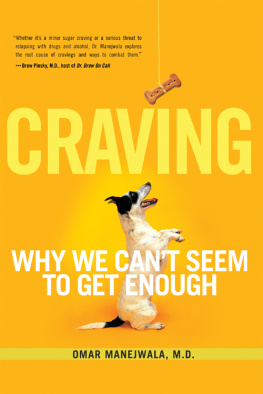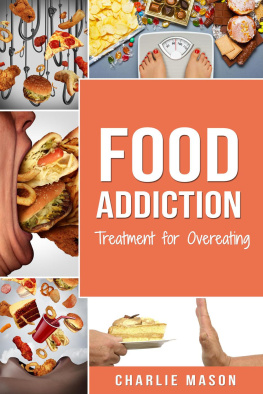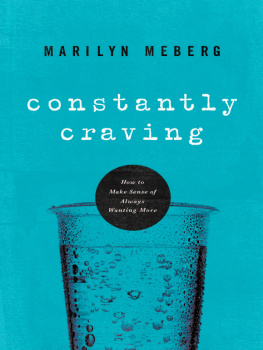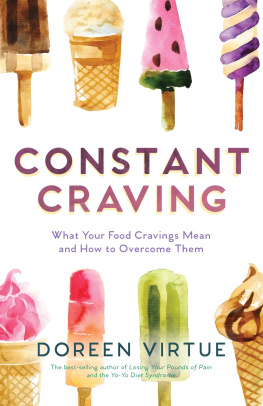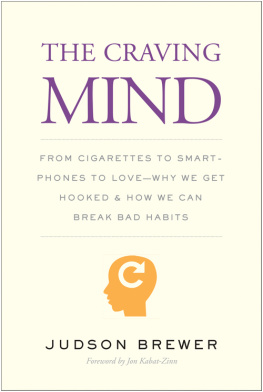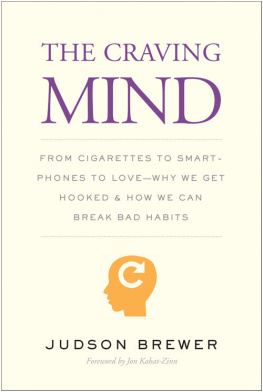Craving
Craving
WHY WE CANT SEEM TO GET ENOUGH
Omar Manejwala, M.D.

Hazelden
Center City, Minnesota 55012
hazelden.org
2013 by Omar Manejwala
All rights reserved. Published 2013.
Printed in the United States of America
No part of this publication, either print or electronic, may be reproduced in any form or by any means without the express written permission of the publisher. Failure to comply with these terms may expose you to legal action and damages for copyright infringement.
Library of Congress Cataloging-in-Publication Data
Manejwala, Omar, 1971
Craving : why we cant seem to get enough / Omar Manejwala, MD.
pages cm
Summary: A nationally recognized expert on compulsive behaviors explains the phenomenon of craving and gives us tools to achieve freedom from our seemingly insatiable desires by changing our actions to remap our brains. When we find ourselves wanting something strong enough, well do just about anything to get itsometimes at the expense of our bodies, brains, banks accounts, and relationships. So why do we sometimes have the irrepressible feeling that we need somethingsuch as food, cigarettes, alcohol, or sexthat we really just want? And how do we satiate that feeling without indulging it? In Craving, Omar Manejwala, MD, translates the neurobiology of this phenomenon into real and accessible terms, explaining why we just cant seem to get enough. He then gives us tools and guidance to find satisfaction without giving in to our cravings. Dr. Manejwala explains how and why our brain drives behavior, how to change the part of our brain that fuels our cravings, the warning signs that craving is evolving into addiction, why craving is the most difficult component of addiction to address, why self-help and spiritual groups that use models like the Twelve Steps are so effective at changing behaviors, receiving encouragement, and remaining accountable. Provided by publisher.
Summary: Explains the phenomena of craving in real and accessible terms, explaining why we just cant get enough. Gives tools and guidance to find satisfaction without giving in to our cravings. Explains how and why our brain drives behavior, how to change the part of our brain that fuels our cravings, and the warning signs that craving is evolving into addiction.Provided by publisher.
Includes bibliographical references.
ISBN 978-1-61649-262-5 (pbk.) ISBN 978-1-61649-461-2 (ebook)
1. Compulsive behavior. 2. Decision makingPsychological aspects I. Title.
RC533.M347 2013
616.8914--dc23
2012047186
Editors note
The names, details, and circumstances may have been changed to protect the privacy of those mentioned in this publication.
This publication is not intended as a substitute for the advice of health care professionals.
Cover design by Theresa Jaeger Gedig
Acknowledgments
No matter how clich it may sound, as anyone who has ever written a book can attest, its impossible to thank everyone who was involved in making it possible. Many of the experts and researchers whose work Ive relied upon are acknowledged in the book itself. Id also like to specifically thank some of the other people whose contributions and support made this book possible:
My editors, Peter Schletty, Sid Farrar, and the fantastic staff at Hazelden Publishing.
Marv Seppala, M.D.; Jim Atkins; Bruce Larson; Stephen Delisi, M.D.; Pam Shultz, M.D.; Joseph Lee, M.D.; Kent Smallwood, Ph.D.; Sarah Nowak, Ph.D.; Cecilia Jayme; Dave Schreck; Rev. Eygl Bjarnadttir; Fred Holmquist; Damian McElrath; and the extraordinary team of professionals at Hazelden Foundation who inspired and taught me during my tenure as Medical Director, and who tirelessly give of themselves every day so that thousands of alcoholics and addicts can find recovery there.
Dr. Martha Horton and Tim Leadbetter, for their insights on shame, courage, and emotional maturity.
The Duke University Medical Center Psychiatry residency program, my co-residents, faculty, and staff.
Collectively, the tutors at St. Johns College, the faculty at the University of Maryland School of Medicine, the faculty at the University of Virginias Darden School of Business, and the many teachers who inspired me every step of the way and who really understood that nine-tenths of education is encouragement.
Mary Beth Schell, librarian at University of North Carolina, Chapel Hill, for her help obtaining hundreds of research articles for this project.
My loving parents, Dr. Bachubhai Manejwala and Rahima Manejwala, without whom no endeavor such as this could ever have happened.
My brother Dr. Fazal Manejwala, whose passion for learning and teaching rubbed off on me at a very early age, and stuck. And my brother Zafar, whose kindness and integrity remain ideals I hope to one day attain.
The many thousands of patients who have trusted me enough to share a bit of themselves with me and let me participate in their healing journey.
And most of all, my sweet, beautiful wife and hero, Cecily, whose support has been unwavering and whose love seems to know no limits.
Introduction
Have you ever promised yourself you would stop doing something, worked hard to avoid doing it, had no intention of doing itand then did it anyway? Whether its that diet you were following so well, a promise to your spouse that you would stay sober this time, or a vow that you would never gamble your paycheck away again, the inevitable always seems to happen: despite your best intentions, you found yourself engaging in the same self-defeating behaviors. The worst part is, in many cases, you never intended to drink that drink, order that dessert, or step into that casino. It just sort of happened.
What explains the mysterious urge to do something that has caused so much damage in the past? What makes that simple thought pop into your mind? When you are doing everything in your power to do better, when you are at your most committed, what brings that powerful image of chocolate into your brain, leading your car toward the grocery store just minutes before it closes? What convinces you to give up what you worked so hard to achieve?
Craving: Part Want, Part Need
Whether its the smell of the great outdoors, a favorite jazz standard, or the smile on your sons face, desire is a universal emotion. Its the cause of much joy and is responsible for countless success stories. We find it nearly impossible (and depressing) to imagine a life without desire. Our healthy and productive desires are the core of what makes life exciting and fun. Yet sometimes these desires become so intense that they start to feel less like wants and more like needs. When these needs go unmet, you may start to get restless or impatient. After a time, you may become increasingly uncomfortable. If the desire is for something helpful to you, something you really do need, or something that will make your life better, then thats a good thing. Its a healthy craving. But for many people, powerful, enduring cravings are anything but healthy, and they can make life downright miserable.
A good working definition of craving is a strong desire that, if unfulfilled, produces a powerful physical and mental suffering. Everyone has experienced this suffering at one point or another, but when these feelings endure or recur frequently, they can be the source of much misery. Cravings are at the heart of all addictive and compulsive behaviors. For some people, it can begin as innocently as a trip to a restaurant, with no intention of drinking, but just to get a meal or visit a friend. The next thing they know, theyve ruined their sobriety. For others, its the apparently irrelevant decision to take a different way home from work, a route that just happens to take them past the doughnut shop. Several days later they wonder how their progress toward their fitness goals were demolished. In each case, whether its the intense, overwhelming, fist-pounding-on-the-bar urge to drink or the ever-so-subtle thought that taking a different road home is perfectly safe, your brain tricks you into repeating self-destructive patterns.

